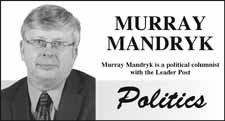So is it ever okay for a premier to seemingly switch direction and go against something he seemed to vehemently oppose and even campaigned against?
Well, sometimes it's not only okay but also the necessary and smart thing to do. Or so we as we may now be finding out in Premier Brad Wall's handling of a possible review of potash royalty rates.
At issue is a remark made while reacting to the news from BHP Billiton that would be delaying final approval on its $13.1-billion Jansen potash mine for at least this year because of the mining giant's less-than-stellar most recent financial update.
Wall mused that we may need a potash royalty structure "based on cost more than it is on volume."
Political staff has tried to spin this comment as no big deal and perfectly consistent with what Wall has said in the past about perhaps one day having to sit down with the industry and look at the royalty rates. Certainly, when pushed on the issue in the past, Wall never completely ruled out looking at royalties one day in the future.
But if you look at all the things that Brad Wall has said in recent memory, a time when the Jansen mine may be on hold and when Vale SA's proposed Kronau mine is postponed would seem a dangerous time to be talking about a royalty review. Or so Wall has repeated told us over the past couple years:
During the election last October, Wall said he feared causing "royalty shock" and scaring off new investment that would hurt provincial revenues and cause job loss. "If we give them royalty shock, if we start jacking around with potash in the middle of worldwide uncertainty, I think we may lose those new mines," Wall said.
"Mr. Lingenfelter's plan is a reckless and irresponsible gamble with taxpayers' money, it will drive Saskatchewan into huge deficits and it will kill jobs," Wall said on the Sask. Party website during the election campaign. "We can't afford to go down that path."
When the former NDP leader first contemplated the idea of a royalty review in March 2011, Wall was even more adamant: "We're on the side of royalty stability and we do believe fundamentally that changing the royalty now will kill jobs, will risk jobs in the province,"
Wall even went so far as to call Lingenfelter's royalty review plans "crazy". (He defended the use of his strong term, but instead called such a potash royalty review "reckless" on future references.)
This was also Wall's consistent message during the BHP takeover bid, telling reporters two years ago: "We're not going to mess with that,"
"What I don't want is royalty shock in this province" that may impact the (then) $6 billion mine expansion plans."
So why would Wall do this when about $16 billion of mine expansion is now in jeopardy?
Well the reality is that over-production is a serious concern that might very well affect potash prices and government revenues in the future - especially with BHP Billiton now talking about adding an immediate four million tonnes a year when the Jansen mine comes on stream.
As for "royalty shock" putting those new mines at risk, it is corporate policy and a world economy that are bigger factors for the mining companies than any fears a friendly, conservative-minded government will hit them with unfair royalties. After all, with Wall's history of opposing "royalty shock", the industry surely has less to fear from a Brad Wall royalty rate review than what they might have got under Lingenfelter.
Notwithstanding Wall's past political rhetoric, it likely makes good policy sense for the Premier to rationally sit down with the industry and start talk about potash royalties.
Murray Mandryk has been covering provincial politics for over 15 years.




